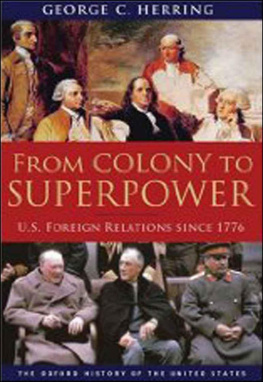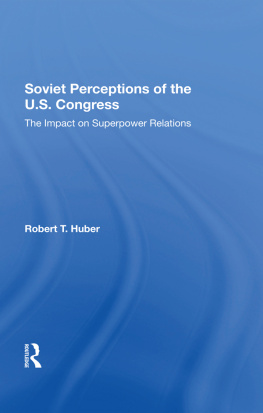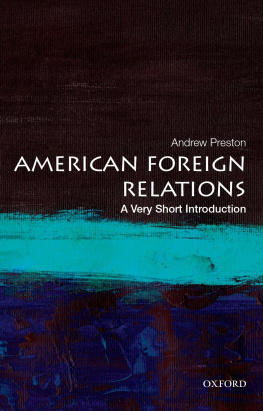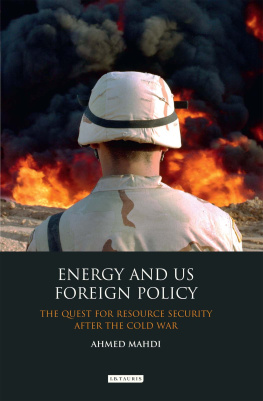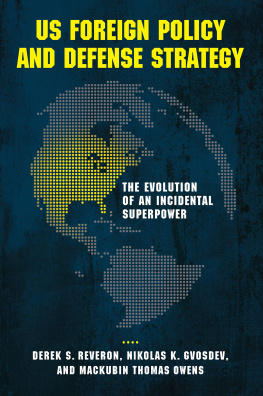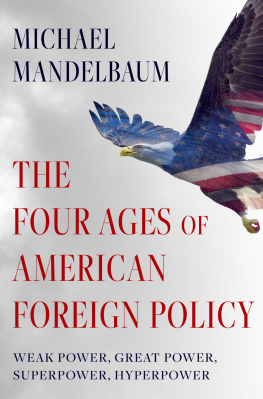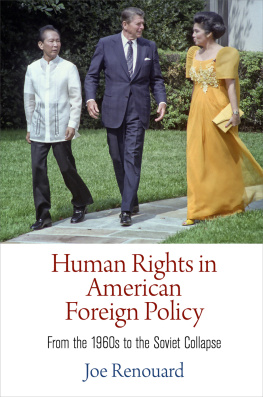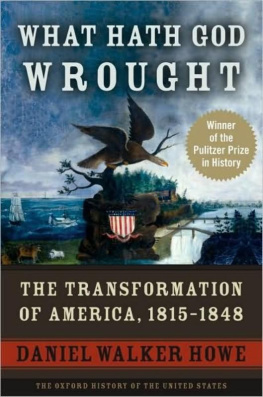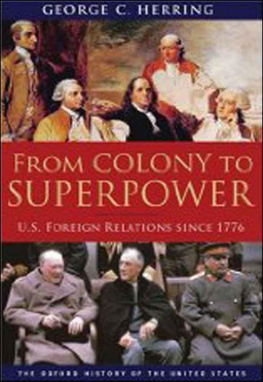From Colony to Superpower
The Oxford History of the United States
David M. Kennedy, General Editor
ROBERT MIDDLEKAUFF
THE GLORIOUS CAUSE
The American Revolution, 17631789
DANIEL WALKER HOWE
WHAT HATH GOD WROUGHT
The Transformation of America, 18151848
JAMES M. MCPHERSON
BATTLE CRY OF FREEDOM
The Civil War Era
DAVID M. KENNEDY
FREEDOM FROM FEAR
The American People in Depression and War, 19291945
JAMES T. PATTERSON
GRAND EXPECTATIONS
The United States, 19451974
JAMES T. PATTERSON
RESTLESS GIANT
The United States from Watergate to Bush v. Gore
GEORGE C. HERRING
FROM COLONY TO SUPERPOWER
U.S. Foreign Relations since 1776
FROM COLONY TO SUPERPOWER
U.S. Foreign Relations since 1776
GEORGE C. HERRING

OXFORD
UNIVERSITY PRESS
Oxford University Press, Inc., publishes works that further
Oxford University's objective of excellence
in research, scholarship, and education.
Oxford New York
Auckland Cape Town Dar es Salaam Hong Kong Karachi
Kuala Lumpur Madrid Melbourne Mexico City Nairobi
New Delhi Shanghai Taipei Toronto
With offices in
Argentina Austria Brazil Chile Czech Republic France Greece
Guatemala Hungary Italy Japan Poland Portugal Singapore
South Korea Switzerland Thailand Turkey Ukraine Vietnam
Copyright 2008 by Oxford University Press, Inc.
Published by Oxford University Press, Inc.
198 Madison Avenue, New York, NY 10016
www.oup.com
Oxford is a registered trademark of Oxford University Press
All rights reserved. No part of this publication may be reproduced,
stored in a retrieval system, or transmitted, in any form or by any means,
electronic, mechanical, photocopying, recording, or otherwise,
without the prior permission of Oxford University Press.
Library of Congress Cataloging-in-Publication Data
Herring, George C., 1936.
From colony to superpower : U.S. foreign relations since 1776
/ George C. Herring.
p. cm. (The Oxford history of the United States)
Includes bibliographical references and index.
ISBN 978-0-19-507822-0
1. United StatesForeign relations. I. Title.
E183.7.H44 2008 327.73dc22 2008007996
1 2 3 4 5 6 7 8 9
Printed in the United States of America
on acid-free paper
For Dottie
Acknowledgments
One of the great pleasures of completing a project like this is to be able to thank publicly the many institutions and people who helped along the way. The John Simon Guggenheim Foundation provided the financial support that, combined with a University of Kentucky sabbatical, enabled me to get started. The Rockefeller Foundation funded a month's stay in the incomparably beautiful and uniquely stimulating environment of Bellagio, Italy, a sojourn that allowed me to shape the final chapter and gain interesting feedback from people in numerous fields of intellectual inquiry. Deans Rick Edwards and Steve Hoch of UK's College of Arts and Sciences provided encouragement and funds for research, as did chairs Jeremy Popkin and David Hamilton of the History Department, my professional home for thirty-six years. Bob Flynn, Keely Jones Green, Shelby Lynn Marshall, and Stephanie May assisted with the research.
Many colleagues and friends gave generously of their time and expertise. John Behlolavek, Jerald Combs, William Freehling, Daniel Walker Howe, Howard Jones, Lawrence Kaplan, Warren Kimball, Thomas Knock, Jeffrey Matthews, Robert McMahon, Melvin Small, Mark Stoler, and Randall Woods read individual chapters covering periods of their specialties and offered invaluable suggestions. Andy Fry shared with me his vast knowledge of nineteenth- and early twentieth-century U.S. foreign policy by reading and commenting on the first half of the manuscript. Steve Wrinn, director of the University Press of Kentucky, cast his sharp editorial eye on numerous chapters. Former Transylvania University English professor Charlie Holmes read the entire manuscript, and the comments provided by this non-specialist keenly interested in international relations were very useful. Robert Divine, Walter LaFeber, Fredrik Logevall, and Jeremi Suri evaluated the manuscript for Oxford University Press and sent me detailed commentary and invaluable criticism and suggestions.
The Boone Seminar furnished weekly diversion in the form of highly competitive tennis and spirited trash talk as well as stimulating conversation about world affairs. After more than ten years on this project, I appreciate more than ever the outstanding work being done by my colleagues in the history of U.S. foreign relations. Their productivity made my task daunting. The quality of their work also made it exciting. It was great fun to continue to learn new things after more than forty years in the field.
Vicki Vaughn of the Patterson School of Diplomacy and International Commerce, where I spent my last semester, arranged for copying, packing up, and mailing out an early draft to various readers. Patiently and with all good humor, Peter Harris bailed his Luddite father-in-law out of computer foul-ups.
I have had the good fortune with this project to work with the best editors an author could hope for. I was enormously flattered when the late Sheldon Meyer, the dean of history editors, invited me to write this volume. I would like to think that he would be pleased with the result. The late C. Vann Woodward read one chapter and offered warm encouragement. Peter Ginna at Oxford helped plan the book. Series editor David M. Kennedy read chapters promptly and thoroughly. His excitement about the project gave me a huge boost. He offered countless suggestions on style and substance, especially in framing the arguments. Susan Ferber has been a wonderful editor, keenly interested in the project, attentive, helpful in every possible way, a superb critic. India Cooper is simply the best of copy editorsand a delight to work with. Caitlin Craven secured the photographs and permissions. Joellyn Ausanka skillfully managed the production process.
Finally, above all, and for so many reasons, I thank Dottie Leathers, my co-worker of nearly forty years, my wife of thirteen. This book is dedicated to her with all my love.
George C. Herring
Lexington, Kentucky
Contents
Maps
Editor's Introduction
From Colony to Superpower is the sole topical volume in The Oxford History of the United States, whose eleven other titles all address discrete chronological periods between the European discovery of the Americas and the dawn of the twenty-first century. George C. Herring has thus taken on a formidable challenge: crafting a coherent historical narrative around the theme of foreign relations through more than two hundred years of American nationhood, while neither ignoring nor repeating material covered elsewhere in the series.
He has succeeded more than admirably. To be sure, readers of other Oxford History volumes will find familiar items here, from the War of 1812 to the high-stakes diplomacy of the Civil War era, the geo-political strategies of World War II, and the disillusioning debacle of Vietnam. But Herring, a renowned scholar of the Vietnam imbroglio, brings strikingly fresh perspective to his accounts of each of those episodes, and many others. He also artfully weaves them into what is undoubtedly the single most comprehensive interpretation of the entirety of America's foreign relations yet written.
Next page
